In this article:
While keeping a check on your portion sizes, following any healthy, balanced diet can help you achieve your desired weight, physique, and any other health goals. Some diet regimens eliminate certain food groups from your diet, whereas others focus on eating controlled portions with more liberal food choices.

What you eat is of paramount importance for the healthy functioning of your body. Thus, it becomes all the more important to be aware of your food choices.
Recent research identifies poor diet and unhealthy eating habits as the primary reasons behind the obesity epidemic in the United States. (1)
According to the Centers for Disease Control and Prevention (CDC), the prevalence rate of obesity stood at 39.8 percent, affecting nearly 93.3 million US adults from 2015 to 2016. This is an alarming situation as obesity entails a risk of noncommunicable diseases including heart diseases, blood pressure problems, diabetes, and cancer. (1)
With so many diet alternatives available, the question about which one is best for an individual is still unclear to many. A diet plan can be generally considered overall healthy if it focuses on a variety of food choices, benefits your overall health, is easy to adhere to for years to come, and can help you maintain your health goals for a lifetime.
Low- or no-carb diets, the DASH diet, the Atkins diet, the keto diet, the pagan diet, the Mediterranean diet, and the vegan diet are just some examples of popular diets to follow. However, the three most popular nutritional intervention regimens, namely, keto, paleo, and Mediterranean, are all the rage these days.
Let us dive into these three diets and dissect their various benefits and downsides to understand what sets them apart from each other.
The Keto Diet
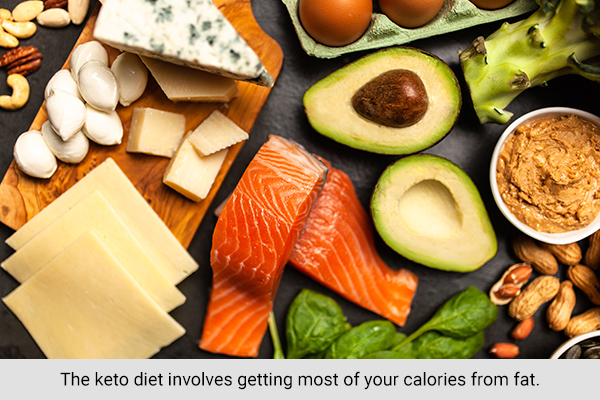
The keto diet involves getting most of your calories from fat. Usually, a standard diet is around 50 percent carbohydrates, which are broken down into glucose the cells use for energy.
Your body is inherently accustomed to utilizing glucose as fuel, but when you start taking fats in generous amounts and limit your carb intake, your liver uses up the stored fats for energy production. The fats are broken down into ketone bodies, which act as fuel for the brain.
A typical keto diet keeps carbs to a minimum (50 grams or less per day), proteins in moderation (around 20 percent of calories), and fats in unlimited consumption. (2)
The restriction on carbohydrates drives the body to use fat for energy expenditure and prevents the rise in insulin levels, which helps curb hunger. The stored carbohydrates and water are also used up in the process. This depletes the glucose deposits and the excess water weight as well.
Some forms of ketogenic diets mostly adopted by athletes and sports professionals allow the consumption of protein and/or carbohydrates in higher amounts. The aim of following a modified keto plan is to retain the ketosis for prolonged periods and keep the lean muscles intact. (3)
It may take a minimum of 3 months of dedicated efforts to get your body adjusted to the keto diet. Eating a western diet on a regular basis can interfere with the body staying in ketosis; hence, a period of 3 months helps your body to acclimatize to the new fuel source.
What Comprises a Keto Diet?
A keto diet is basically a high-fat, moderate-protein, and low-carbohydrate diet. When it comes to a keto diet, it is all about the nutrition facts, especially the amount of each macronutrient you are consuming. The recommended intake in a keto diet is: (4)
- Almost 60 percent fat, 35 percent protein, and 5 percent carbohydrates
- Generous consumption of fat sources such as coconut oil, lard, butter, cocoa butter, nuts, seeds, tofu, and olive oil
- Fatty fish such as tuna and salmon
- Starchy green vegetables such as spinach, kale, and broccoli
- No fruit apart from avocados
- Full-fat dairy products such as cream, plain Greek yogurt, and cheeses
- Limited dairy products that are high in carbohydrates such as milk and ice cream
Health Benefits It Offers
The keto diet has been associated with the following advantages for your health:
1. Helps control neurodegenerative disorders
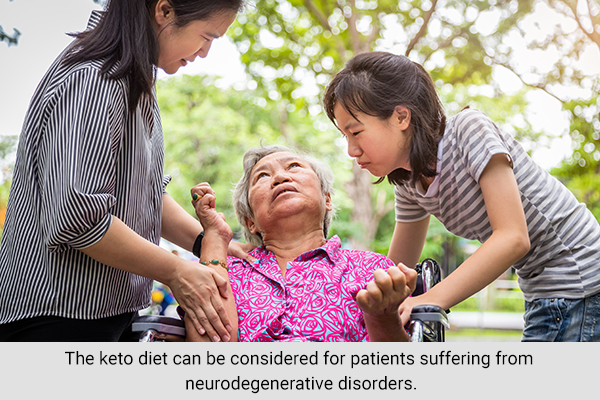
The keto diet can be considered for patients suffering from neurodegenerative disorders such as epilepsy, Alzheimer’s disease, Parkinson’s disease, and multiple sclerosis.
Studies have shown that the supplementation of a keto diet in children helped control epileptic seizures for a short to medium time period. The effects of the keto diet were found to be quite similar to those from conventional antiepileptic drugs. (5)
The possible mechanism behind the considerable reduction in seizures is due to the decreased glucose levels and increased metabolism of ketone bodies along with the reduction in glycolysis. Studies have highlighted that the resultant decrease in glycolysis when consuming a keto diet can help reduce seizures. (2)
It has also been observed that the considerable increase in the concentration of ketone bodies and the concomitant decrease in blood sugar while on a keto diet can suppress various pathways that can potentially help various disorders that affect the brain. (6)
2. Aids in weight loss
Ketogenic diets have carved a place in the list of potential ways to lose weight. Following a keto diet can help you lose weight by curbing your hunger and appetite and keeping you satiated for longer. (7)
3. Reduces inflammation
The induction of ketosis is known to pump the mitochondria of the body cells such that they supply energy and fight oxidative stress and inflammation at a faster rate. (8)
4. May help regulate type 2 diabetes
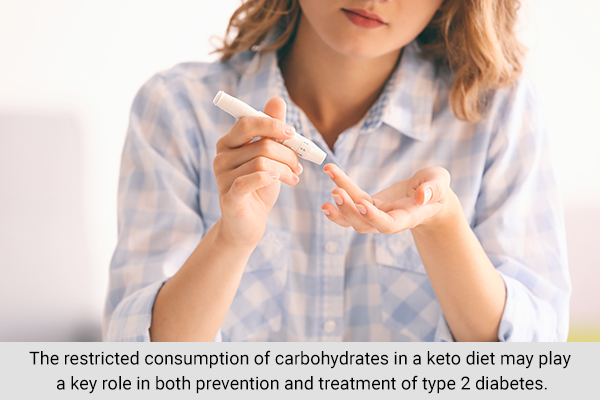
According to the US Center for Disease Control and Prevention, nearly 55 percent of patients suffering from diabetes are obese and 85 percent of them are overweight. The restricted consumption of carbohydrates in a keto diet may play a key role in both the prevention and treatment of type 2 diabetes. (4)
A 2012 study concluded that the low levels of carbohydrates in a keto diet significantly lowered blood glucose, total cholesterol, urea, low-density lipoprotein cholesterol, triglycerides, body weight, and body mass index in obese subjects after 24 weeks. Also, the keto diet group had a significant decline in waistline measurements and improved glycemic control in type 2 diabetes. (4)
5. May help cancer patients
The state of ketosis brought about by a keto diet is reported to have enhanced the response of preclinical experimental models to chemotherapy, along with alleviating the normal tissue side effects of the therapy.
Also, the keto diet is associated with a reduction in tumor size in experimental animal models of malignant cancers of the colon, gastric, and prostate. (9)
Downsides of the Keto Diet
The keto diet warrants caution in some areas.
- Keto flu is an adverse effect of the ketogenic diet that lasts for a few weeks after starting the keto diet. This is primarily due to the changes in your diet that cause symptoms such as bad breath, changes in bowel habits, lack of energy, and muscle cramps. Hence, monitoring your blood glucose and ketone levels is essential for people on a keto diet.
- The keto diet may deplete the levels of triglycerides and sugar in your blood. Individuals with low blood sugar levels must be cautious before doing the keto diet. If you have diabetes or prediabetes or have taken medication for blood sugar, speak with your doctor before starting a keto diet.
- Eliminating carbohydrate sources such as whole grains, legumes, fruits, and vegetables can lead to nutritional deficiencies like that of fiber and key vitamins and minerals.
- It is highly recommended that individuals with pancreatitis, kidney stones, liver problems, disorders of fat metabolism, carnitine deficiency, and porphyria must not try the keto diet. (10)
The Paleo Diet
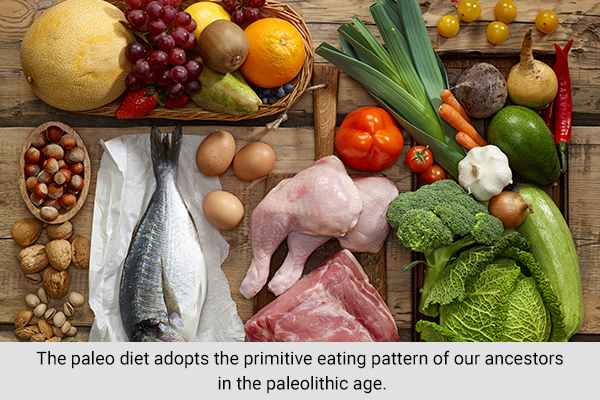
The paleo diet adopts the primitive eating pattern of our ancestors in the Paleolithic age.
The paradigm shift in the eating patterns of humans has resulted in modern methods of food preparation. The agricultural revolution entailed the evolution of man from a hunter and gatherer to that of eating more processed grains. Thus, the paleo diet eliminates most processed foods made with highly refined ingredients.
Although it is impossible to live like the early men, the paleo diet idolizes the eating habits of their times by eliminating the use of foods that have undergone modern processing. This diet comes to the fore in view of the various diseases that are deemed to be the result of consuming processed and refined foods.
What Comprises a Paleo Diet?
The paleo approach focuses on the consumption of local grass-fed animal-based meats and sustainable organic vegetable produce while refraining from processed foods. Also, paleo is a diet consisting mostly of proteins, fiber, antioxidants, and potassium while being low in carbs, sodium, and sugar.
The paleo diet includes foods that can be grown, reared, hunted, and gathered.
- These include poultry, grass-fed meat, eggs, seafood, vegetables, roots, and fruits.
- The diet restricts the consumption of dairy, grains, legumes, processed fats, refined sugars, and salt.
- Individuals on a paleo diet can have green tea and plenty of water.
- The consumption of foods containing additives and preservatives must be completely avoided.
The abundance of proteins in the paleo diet makes it quite popular among fitness enthusiasts who are seeking to bulk up on muscle mass.
The paleo diet is often referred to as “clean eating” and for many can be followed for a considerably long time period. It does not require any monitoring of the amount of foods consumed or calorie counting. This makes it easier on the part of individuals to follow and accomplish their desired goals.
Health Benefits It Offers
Adopting a paleo lifestyle has been associated with the following potential health benefits:
1. Aids in weight loss

The paleo diet may be one way to help some with weight loss.
In theory, the paleo diet significantly improves waist circumference, weight measurements, and BMI because it helps eliminate extra calories from the diet. However, more well-designed studies are needed to determine the effects the paleo diet has on health and weight loss. (11)
2. May help improve diabetes
The paleo eating style may lower the risk of type 2 diabetes and help in treating it.
A 2015 study included people with type 2 diabetes who followed either a paleo or standard low-fat diet for 2 weeks. Both groups showed improved outcomes, but the paleo group had greater benefits on glucose control. (12)
3. Reduces the risk of cardiovascular diseases
Following the paleo lifestyle may contribute to a healthy heart.
Eating foods recommended in the paleo diet can help decrease the various parameters of cardiovascular diseases such as body weight, cholesterol, blood pressure, HDL, and glucose tolerance. (13)
Greater benefits in lipid profiles were seen in people with type 2 who followed a paleo diet compared with those consuming a standard low-fat diet. (12)
Downsides to the Paleo Diet
Following the paleo diet may have its own complications and downsides. Certain instances that warrant caution include the following:
- Despite the significant effects on weight management and other diseases, eliminating whole grains, legumes, and some fruits and vegetables can deplete the nutritional requirements of vitamins, minerals, and antioxidants essential for good health.
- The focus on eating grass-fed meat, organic vegetables, or wild seafood makes the diet an expensive dietary approach. This may limit the inclination of low-income groups towards this diet form.
- Since the paleo diet cuts out a wide range of food sources, eating at social gatherings can be an awkward situation.
- Reduced consumption of calcium is one of the drawbacks of the paleo diet. This can entail a risk of calcium deficiency and osteoporosis in the near future.
The Mediterranean Diet
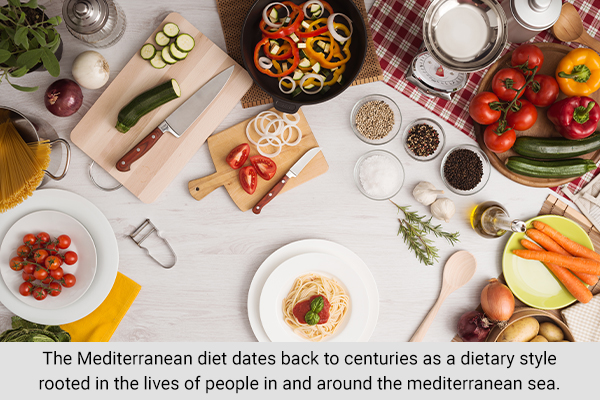
The Mediterranean diet dates back centuries as a dietary style rooted in the lives of people in and around the Mediterranean Sea. (14) This dietary approach has by far garnered the maximum support from individuals around the world due to its superlative abundance of nutrition.
The Mediterranean diet involves eating more plant-based foods and monounsaturated fats (often called good fats) and limiting the consumption of meats and carbohydrates, in comparison with the regular American Diet. The carb content in a Mediterranean meal is confined to unrefined fibrous sources such as vegetables, fruits, beans, and whole grains.
The Mediterranean diet has a sociocultural aspect as well that adds to the traditional facet of the diet focused on strengthening the social fabric. This includes plenty of physical activity, regular meal times, eating in a social circle, drinking wine, and resting after meals.
Individuals living in the Mediterranean Basin have been reported to have lower-than-expected rates of heart diseases. (15) The diet has also been touted as “heart friendly” due to its role in stabilizing the various parameters of blood sugar, cholesterol, and triglycerides and, in turn, reducing the risk of cardiovascular diseases, diabetes, and other illnesses. (16)
What Comprises a Mediterranean Diet?
The Mediterranean diet includes an array of nutritionally dense foods abundant in fiber, good fats, and other essential nutrients. The balanced mix of nutrient-rich foods makes the Mediterranean diet worth all the fame it has garnered.
The adequate intake of micro- and macronutrients in this diet reduces the occurrence of nutritional deficiencies occurring in individuals as compared with those following any other diet. (17)
This dietary pattern includes:
- Rich portions of whole grains, fruits, vegetables, legumes, lentils, beans, tree nuts, seeds, and olives
- High amounts of seafood and fishes
- Limited intake of eggs, poultry, and dairy products such as cheese
- Reduced consumption of red meat
- Moderate consumption of wine during meals
- Use of olive oil as the main source of added fat for cooking purposes is permissible. Besides being a source of good fats, olive oil has added benefits to human health. (18)
- Meals devoid of rich sauce and gravy preparations
These foods are higher in nutrition and cost effective than the typically used processed and packaged foods. These can be easily accessed, which makes the Mediterranean diet a flexible diet that can be adopted as a way of life.
Health Benefits It Offers
The Mediterranean diet has a plethora of associated potential benefits on human health:
1. Promotes a healthy heart

The Mediterranean lifestyle emphasizes on the consumption of good fats, which helps curtail the concentration of bad cholesterol in the blood and thus confers protection from several cardiovascular diseases.
A 2013 study with over 7,000 people observed that an energy-unrestricted Mediterranean diet supplemented with either nuts or extra-virgin olive oil completely reduced the risk of cardiovascular diseases. (19)
2. Promotes brain health
The anti-inflammatory and antioxidant nature of the Mediterranean lifestyle is associated with the promotion of cognitive health and brain power. This is due to the abundance of omega-3 fats and antioxidants in the included foods of the Mediterranean diet.
There is some evidence that the Mediterranean diet may help reduce the degeneration and impairment of cognitive power, reducing the risk of Alzheimer’s disease and mortality among Alzheimer’s patients by way of its inflammation- and oxidation-combating power. (20)
3. Reduces blood sugar and risk of diabetes
The low consumption of sugar and refined carbohydrate in a Mediterranean diet can help stabilize blood sugar levels and lower the risk of diabetes.
Studies conducted in Southern Europe suggested that adopting the Mediterranean diet in recently diagnosed diabetics but previously healthy individuals enabled better glycemic control and reduced dependence on diabetes drugs. (21)
4. Helps obese individuals
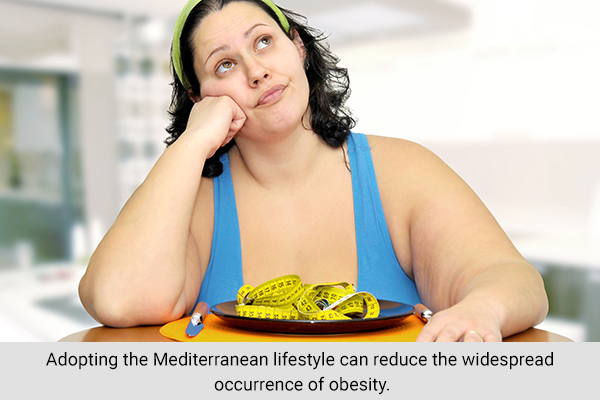
The oxidative stress, inflammation, and associated mechanisms that take place inside an obese individual’s body can be curbed by the intake of a Mediterranean diet.
A 2012 study concluded that acquiring the Mediterranean lifestyle can reduce the widespread occurrence of obesity, specifically the accumulation of fat in abdominal and visceral tissues. (22)
5. May reduce the risk of cancer
The nutritional richness of the Mediterranean diet is from the varied fruits, vegetables, good fats, whole grains, and fibers in it. A fibrous diet may help prevent cancers of the digestive tract, including colorectal cancer.
It has been suggested through various case-control studies that the use of good fats such as olive oils as a replacement of butter or other harmful fat sources may help decrease the risk of certain cancers. (18)
Downsides to the Mediterranean Diet
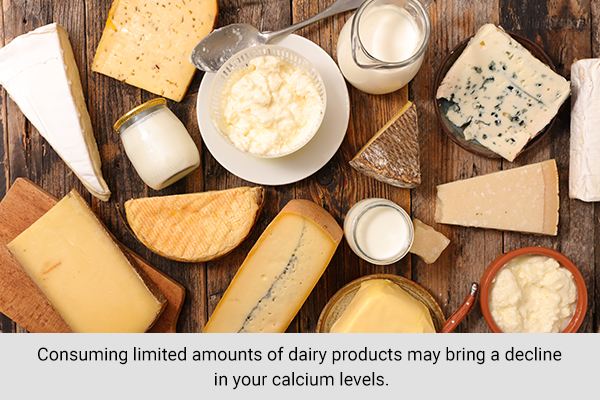
Although superior to various other diets in terms of nutrition and benefits, the limitations and open-ended usage of certain foods may cause some problems.
- The uncontrolled consumption of good fats such as nuts and olive oil must be checked to avoid the storage of excess energy in the form of fats. Portion control is of paramount importance here.
- Consuming limited amounts of dairy products may bring a decline in your calcium levels, which could increase the risk of osteoporosis in some people later in life.
- Wine is a component well integrated into the Mediterranean eating pattern. However, wine consumption is permissible in moderate amounts ONLY to avoid any health problems. Drinking more than the moderate intake can have negative health consequences.
- Some individuals must strictly avoid wine. These include those who have an addiction to alcoholic beverages or have a history of alcohol abuse, pregnant women, at-risk groups for breast cancer, or those who presently have a health condition that may worsen with alcohol intake.
Physical Activity: An Addition to the Mediterranean Diet
The Mediterranean diet is complemented by regular physical exertion of at least 30 minutes throughout the day. Moderate physical activity helps to balance the energy intake and body weight and allows the body to reap the benefits of the diet on your health.
Go for exercises that increase your breathing and heartbeat such as aerobic exercises. Aside from brisk walking, walking, cycling, jogging, running, or swimming, you can also engage in sports such as football, dancing, gardening, or doing some home work. It is encouraged to engage in leisure sports and physical activities with others to promote a sense of camaraderie. (17)
The Mediterranean lifestyle is naturally an active lifestyle that also includes the added health benefits of physical exercise.
Summary of the Comparative Analysis
| Parameters | Ketogenic Diet | Paleo Diet | Mediterranean Diet |
|---|---|---|---|
| Key Purpose | Switching the fuel source from carbs to fats | Eating in a way similar to our ancestors, curbing the consumption of processed and packaged foods | Nutrient-dense dietary approach |
| Nutritional Content | High amounts of fat and low amounts of carb | Diet eliminating processed foods | Abundance of fiber, proteins, good fats, and vitamins and low in refined carbs |
| Nature and Adherence | Very restrictive and difficult to adopt for a long time period | Quite restrictive, not flexible enough to adhere to for long time periods | Mostly inclusive and easier to retain in your lifestyle |
| Alcohol Use | Permitted with limitation | Not permitted | Permits the use of wine but in moderate amounts |
| Foods to Eat | Fatty foods such as butter, olive oil, fatty fishes, cheese, avocados, eggs, nuts, nut butters, ghee, grass-fed meats, organ meats, and green, nonstarchy low-carb vegetables | Unprocessed food such as grass-fed meats, fish, seafood, eggs, nuts, seeds, healthy oils, and vegetables and limited fruits | Focuses on plant foods, fresh fruits, beans, nuts, seeds, olive oil, whole grains, and low meat consumption |
| Foods to Avoid | Sugar, flours and cereals, processed foods, starchy veggies, and beans or legumes | Whole grains, beans and legumes, and most of the dairy products | Refined sugar, refined flours, processed foods, and limit red meat |
| Who May Want to Attempt | Individuals with type 2 diabetes or prediabetes, obese individuals, and women with PCOS who wish to follow a diet low in glycemic index | Physically active individuals keen on gaining muscle mass and tracking their weight | Older adults who are keen on maintaining weight, individuals at risk of heart diseases, and those interested in following an overall healthy diet |
| Not Recommended for | The keto diet is contraindicated in patients with liver problems, pancreatitis, porphyria, carnitine deficiency, and kidney stones. Those who are on diabetes medication should consult their physician before trying. | Vegans or vegetarians due to its reliance on meat. Also, following a paleo diet is expensive. | Individuals with low iron levels may need to make sure they are getting adequate iron from plant sources. |
| Advantages | May help: Epileptic patients and even individuals with Alzheimer's disease or Parkinson's disease, reducing weight, and stabilizing blood sugar levels in patients with type 2 diabetes. | May help: In weight loss, diabetes patients, and in reducing the risk of heart diseases. | Is: Heart friendly, helpful in reducing fatty deposition from the abdominal region, nutritionally dense, good for brain health, promoting physical exercise and social and cultural growth. |
| Disadvantages | Nutrient deficiencies of various vitamins and minerals, long-term risk of cardiovascular diseases not known, constipation | May be an expensive option to sustain for a long time period, possible calcium deficiency, and not as flexible to be taken as a lifelong dietary approach | Limitations on dairy may bring a decline in calcium levels. Alcohol inclusion may be related to abuse if one can't keep intake to moderation |
Final Word
Based on your health goals, choose what may be the best diet for you. Making health-conscious food choices and physical activity are smart ways to attain your objectives behind the diet.
When it comes down to these three diets, weigh your needs so you can adopt a particular dietary pattern to support your health and sustain it for a lifetime.
Note: Always consult a registered dietitian-nutritionist to get advice on a combination of diet plan and exercise regimen that you can pursue in accordance with your personal health goals and lifestyle.
- Was this article helpful?
- YES, THANKS!NOT REALLY


